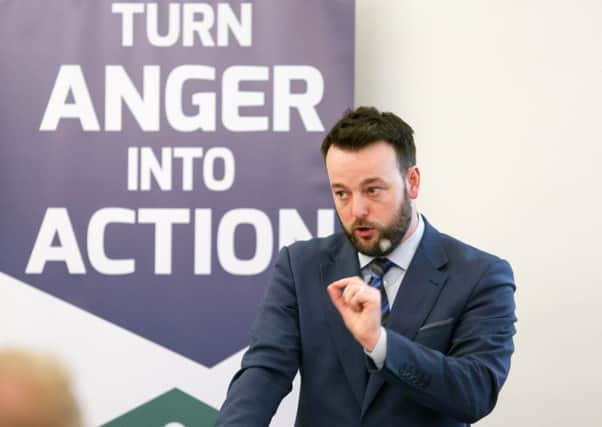SDLP adds voice to fears over proxy vote explosion


The SDLP has voiced serious concerns about the enormous growth in proxy voting in Northern Ireland, adding to those already aired by the DUP.
Both SDLP leader Colm Eastwood and former minister Mark H Durkan expressed unease on Tuesday about the fact that the number of proxy voters increased by roughly 49% in a single year.
Advertisement
Hide AdAdvertisement
Hide AdThe latter MLA also said that he know the system has been “abused” recently in his own constituency of Foyle.
The issue of the explosion in proxy voting was the basis of the News Letter’s front page story on Tuesday. READ IT HERE.
Arlene Foster had voiced concerns in the article, saying there was “little rational explanation” for the sharp jump, or for why proxy voters are concentrated so heavily in some areas, not others.
On Tuesday, Mr Eastwood said on Twitter: “A lot of concern about huge rise of postal & proxy votes in nationalist areas.
Advertisement
Hide AdAdvertisement
Hide Ad“I can assure people – the SDLP hasn’t been orchestrating it.”
He added: “For the record – there is absolutely nothing wrong with LEGITIMATE postal/proxy votes. We help people apply all the time.”
Meanwhile, Mark H Durkan wrote on Twitter: “The system is open to abuse and has certainly been abused in Foyle recently... some people signed postal applications only to have proxy section completed afterwards.”
The Electoral Office (which runs elections in the Province) said it had not been approached by Mr Durkan about his allegations.
Advertisement
Hide AdAdvertisement
Hide AdThe police also said that no such allegations were reported to it this year.
The number of proxy votes leaped from 6,644 in the 2016 Assembly election to 9,920 in the 2017 Assembly election.
In addition, a breakdown of the statistics by the News Letter shows that proxy voters are concentrated in six consitituencies, all nationalist/republican dominated – namely, West Belfast, Newry and Armagh, Fermanagh and South Tyrone, Foyle, Mid Ulster, and West Tyrone.
In proxy voting, a person fills in a form allowing someone else to use their polling card at a polling station.
Advertisement
Hide AdAdvertisement
Hide AdThe person tells the proxy how they want to vote, and entrusts them to carry out this wish.
You have to give a valid reason for why you want to use a proxy vote. Two main ones exist – either you are too ill to vote in person, or you are away from home.
If you are disabled or too ill to vote, then documentary evidence must be provided or a medical professional must attest to it.
However, if you are going away travelling, you do not need to provide documentary proof.
Advertisement
Hide AdAdvertisement
Hide AdUnder the law, electoral officers have to be satisfied on balance of probabilities that someone cannot reasonably be expected to vote in person, and needs a proxy vote.
There are two types of proxy vote – permanent and temporary ones.
When it comes to postal voting, this involves applying for a voting slip – complete with names of candidates and boxes for voting – to be sent to your address.
You then fill this out, send it back, and the vote is counted – without having to rely on someone else to cast it.
Advertisement
Hide AdAdvertisement
Hide AdYou must also give valid reasons for needing a postal vote. Again, the main ones are travel or incapacity.
The number of postal votes likewise grew from 2016 to 2017, from 17,573 to 19,670 (a growth of about 11.9% in a single year).
The chief electoral officer Virginia McVea has said that “no systemic practices that are untoward or illegal” had been drawn to her attention, and that it would not be appropriate for her to speculate about the reasons for the growth.
Sinn Fein said in a statement: “Any citizen is perfectly entitled to apply for a postal and proxy vote if they are unable to attend the polling station on the day of the election.
Advertisement
Hide AdAdvertisement
Hide Ad“That is their right in any democracy and I would have thought that people exercising that right would be welcomed by political parties. Instead we see both the DUP and the SDLP today raising ‘concerns’ as if these voters have done something wrong.
“They haven’t done anything wrong as has been confirmed by the Electoral Office.
“What is wrong is the fact that 60,000 people were undemocratically and unfairly removed from the electoral register last year. And the fact that almost 3,500 people were turned away from the polling station when they turned up to vote in the Assembly election.
“Perhaps that is where the DUP and the SDLP should be focusing their concerns rather that demonising the electorate for exercising their democratic entitlement.”